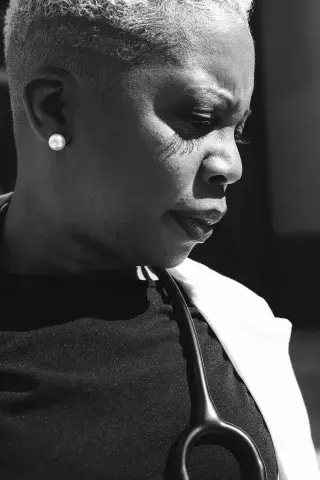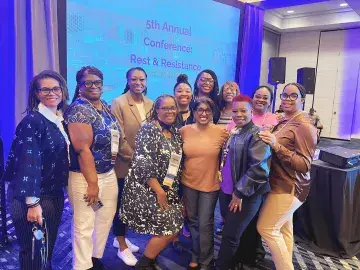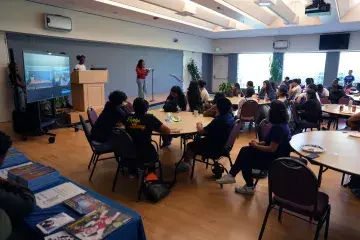Getting Ahead of Trafficking

How Shelitha Campbell and SMU's family nurse practitioner program are doing their part in the fight against human trafficking in the Bay Area
“Do the best you can until you know better. Then when you know better, do better.” — Maya Angelou
Shelitha Campbell, DNP, took those words to heart after a friend working in the juvenile justice system told her, “African American girls are number one on the list of being trafficked, especially in the Bay Area.”
This fact shook Campbell, an Oakland native, wife, and mother of two.
“I have a daughter and a son. Back then, my daughter was in middle school. And when I learned that the average age of trafficking victims was about nine or ten, I had this reflective moment: ‘Oh my God, I need to do something ... right now.’”
Campbell, who joined SMU as an assistant professor in the Family Nurse Practitioner (FNP) program in 2019 before becoming co-director in 2021, sought to share her newfound knowledge with her children, family, and friends.
She also prioritized it at A Sista’s Touch, a non- profit that elevates Black women and girls.
“Even though we were just starting back then, it was important to connect ourselves to an area of focus that would not only impact our population, which was African American girls,” she says, “but highlight an issue that was really impeding our community.”
Since 2018, just one year after she co-founded A Sista’s Touch, Campbell has worked with anti-trafficking groups to raise awareness about human trafficking.
At Roots Community Health Center, she works as a family practice provider and faculty practice clinician. In her faculty role, she offers clinical experience in pediatrics to FNP students, showing them the impact of social determinants of health and the correlation to systemic inequities, which is critical in preventing human trafficking.
“Once I understood that we weren’t having preventative conversations, I knew it was time to start having them, not just with our patients, but their families, too.”
Prevention, she added, is critical to changing people’s narratives around trafficking.

“Too often we, especially the media, focus on someone who has already been trafficked and/or is receiving services to heal from their experience of being victimized,” she says.
“I began to learn that many young Black and brown girls throughout the Bay Area, even ones from well-established homes or who attend private schools, are being trafficked,” she says. “So, it opened my mind — they don’t just come from poverty or single-parent homes.
As co-director of SMU’s Family Nurse Practitioner program, Campbell believes much more can be done to prevent human trafficking and help those who might be victims.
“Since we are at Samuel Merritt University and we are embedded in the City of Oakland, I’m more intrigued than ever with becoming more proactive in stopping youth, primarily Black children, from being trafficked,” she says.
To that end, Campbell is doing her part to assist SMU in collaborating with private and public organizations fighting human trafficking so that SMU nursing students can be at the forefront of leading with trauma-informed care.
“The goal is to remove our biases about who or what a trafficking victim looks like,” she says. “So, cultural humility opens the door to the idea that you don’t have to have a ‘lived experience’ to have empathy or lead with compassion. I think that’s something that we as a healthcare institution need to adopt.”
The important thing, Campbell says, is to take action.
“We must address this as a community and give voice to individuals, especially when they are young and need to be aware of how to protect their bodies,” she explains. “If we don’t break the silence that these tragic things are happening, the victimizers, traffickers, and perpetrators win.”


